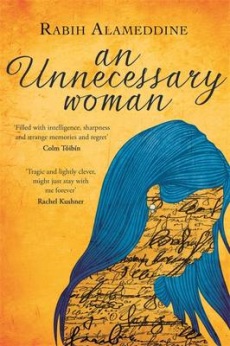 by Rana Asfour It was Destiny that made me choose to read this book on New Year’s Eve. Melodramatic words to start a review, when at my age, I should know better. And yet, ‘like a teenager, I too can rebel’, I too can change the rules with which to start a review. For there is nothing ‘un-dramatic’ or even slightly ordinary about Rabih Alameddine’s latest novel, ‘An Unnecessary Woman’. Aaliya Sobhi Saleh is a seventy two-year-old divorced retiree who has lived all her life in Beirut. She begins her tale ‘with a badly lit reflection. One of the bathroom’s two bulbs has expired’ where she stands with a dye job gone wrong (percolating remembrance, red wine, an old woman’s shampoo: mix well and wind up with blue hair), a toothbrush in hand looking at a murky image of herself reflected in the only mirror in the entire house. A smudged mirror she rarely cleans. Her sink, by contrast, is immaculately white; its bronze faucets sparkle. And so, ‘we do not need to consult Freud or one of his minions to know that there’s an issue here’. A former bookseller at a not-so-busy bookshop, Aaliya since the age of twenty-two has ‘begun a translation every January first’. An autodidactic, who has long ago abandoned herself ‘to a blind lust for the written word’ Aaliya has managed to translate several works of literature into the Arabic language. What is intriguing about all this is that she has told no one what she does nor shown her finished work to anybody. The completed works eventually end up in a labeled carton box that is later stored in the empty maid’s room and bathroom; ‘I create and crate’. Aaliya is alone. A deceased ex-husband, her only friend dead, she childless and distanced from her mother and step-family, a recluse uninterested in the company of others preferring isolation. She is an obstinate, determined, highly observant, feisty, witty, unapologetic grumpy old woman with a lot of oomph (all attributes Aaliya would most likely scoff at were she real). Aloneness, after all, was a choice she made yet it was also ‘a choice made with few other options available. Beiruti society wasn’t fond of divorced, childless women in those days’. Aaliya lives in Beirut, where teenagers hang out at Starbucks ‘lounging in seemingly uncomfortable and unsustainable positions’, a Beirut where ‘traffic war’ rages and ‘chaos rules’, where ‘dating, premarital cohabitation, adultery and promiscuity became ordinary painted scenes of the current Beiruti landscape’. This is a Beirut that ‘belongs to the young and their apathy. That is no country for old men. Or old women for that matter’. So, it is in the solace of her home library that Aaliya is truly herself. Among her books and authors and poets and composers. And what an enviable collection that is. It is in these parts of the book that voracious readers will feel that they are in fact in the presence of greatness. Aaliya may feel like her family’s ‘unnecessary appendage’, yet as keeper of books she is a Goddess among Gods. Tolstoy, Gogol, Hamsun. Gordimer, Malouf, Kundera, and Kadera. And so many more still. It is through books (and an AK-47), that Aaliya has survived her life. Books show her ‘what it’s like to live in a reliable country where you flick on a switch and a bulb is guaranteed to shine and remain on’. And while an insane Lebanese civil war raged on and ‘young men in perfectly clean uniforms were able to shoot people while gnawing on a kebab sandwich and sipping Pepsi’ it was between the covers of books that she found comfort. When ‘the glow of Sabra burning illuminated Beirut’s skyline’ it was Eliot’s ‘The Waste Land’ she read because ‘someone had to’. And it is a Pessoa quote that is at the forefront of her mind when she comes face to face with her first corpse. And while her city was ‘self-immolating’ she was busy teaching herself how to listen to music. Aaliya is suffering a crisis that she knows not the cause of. ‘A creature of habit’ she abhors change, doesn’t adapt well to it. Her blue hair, her senile ‘modern-day succubus’, screaming mother unexpectedly showing up at her doorstep, her neighbors (the three witches) living in her building who turn saviors, the rain, the persistent insomnia with the memories that come flooding uninvited are proving overwhelming. Aaliya is tired and only wants to rest. The long nights are occasions to question her beliefs, her thoughts on life, art, reading. Unbidden memories resurface and ghosts awaken as if from a deep slumber. However, it is ‘the loneliness, the abject isolation’ that is a reminder of ‘how utterly ‘inconsequential’ her life has become, ‘how sad’. ‘An Unnecessary Woman’ is not an easy read (with often harsh quite brutal truths and observations) and yet it is not one that you will want to read through quickly anyway. Each sentence is meticulously constructed, each word deliberate and in its exact place, and the result is a work of beauty and ingenuity. This book is for those who ‘live for art’, it is for survivors of atrocities who can still find beauty in the extremely grotesque. It is about love (for oneself, for others, for beauty, for ugliness), loss (of country, freedom, choice, hope), redemption, aging and death. It is about music, writing, and God. It is about Beirut, past and present, from someone who knows Beirut ‘how she was, how she has changed through the years’ from the lips of a woman who has ‘never left her’.
0 Comments
Your comment will be posted after it is approved.
Leave a Reply. |
Archives
March 2021
|




 RSS Feed
RSS Feed
